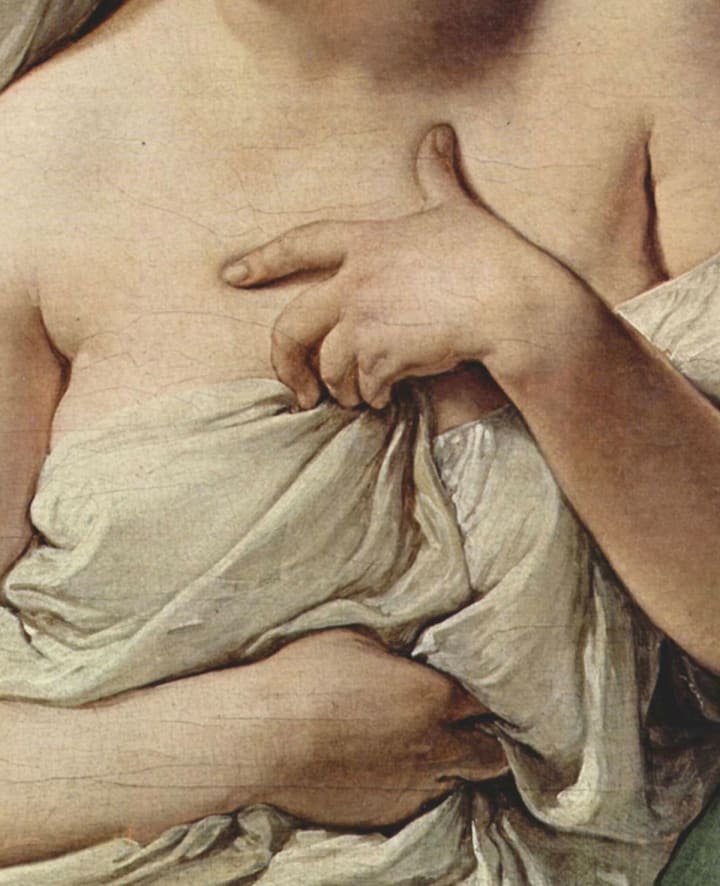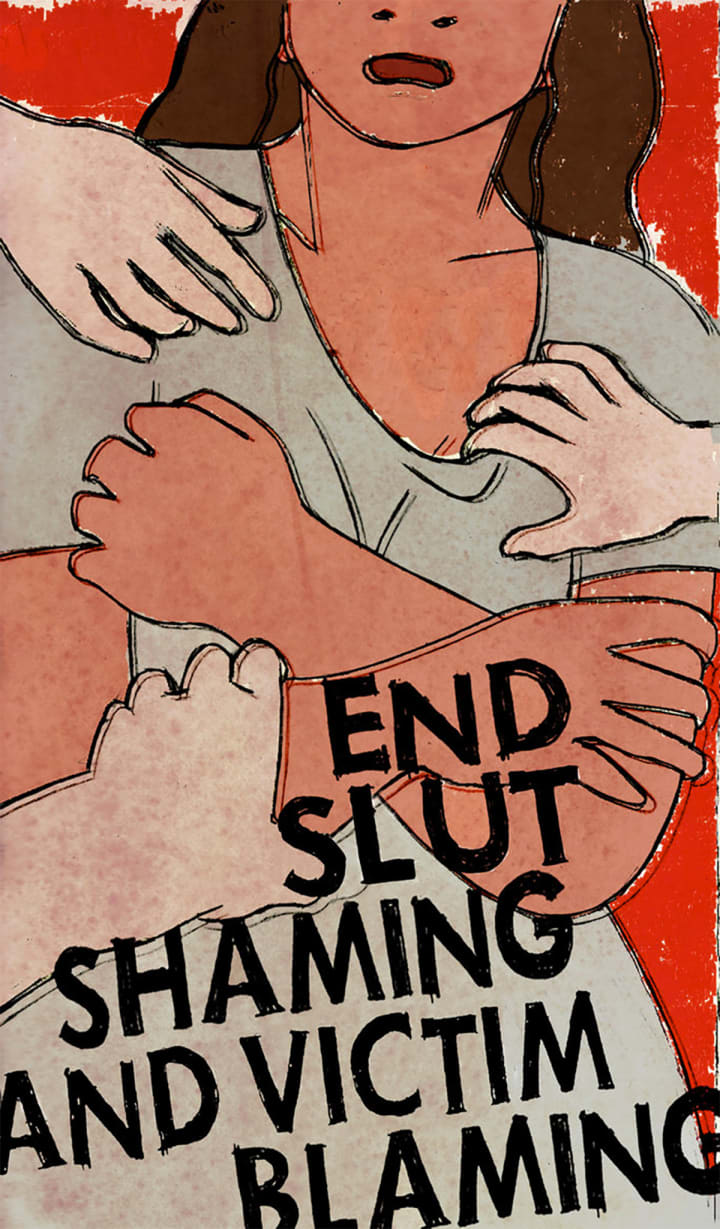History of the Word 'Slut'
From Chaucer to the drunken guy at the dive bar, the word 'slut' has been used to belittle women for centuries.

We all know a long list of insulting ‘four letter words’, some more impactful than others. However, in today’s society, one stands out to have deep social impact with a multitude of meanings; from degrading a woman’s status derived through her sexual life to a generic ‘throw-around’ insult much like any other.
The word actually originated back in the year 1450, where it almost always referred to a woman who is “sexually promiscuous”, who has sex with almost anyone. On the other hand, earlier meanings often suggest “kitchen maid” or “untidy, dirty woman” pointed to the meaning of “slut” before its usage today.
In a society deeply rooted in equality, acceptance and inclusion, the term “slut” used in a derogatory manner drags us back to our medieval roots; belittling a female for their life choices whilst the modern-day definition is simply a woman with the same sexual morals as a man.
With this in mind, the insult “slut” isn’t strictly reserved to just females. There have been famous documented cases of prominent males in history being brandishes with the S-word.

Image via Tumblr
In 1386, before the archaic definition of insulting strictly females for their sexual behaviors, Geoffrey Chaucer - known largely as the Father of English literature, used the word “sluttish” to describe a man of “slovenly” status – a man who is dirty and untidy, much like the early definition attached to “slut” females in 1450. In fact, by the late 1300s, slut was only used exclusively in reference to an untidy or dirty man. A weird and saddening thought that through male knowledge and understanding of literature and generalized societal dominance, the insult could be subverted to belittling females.
So how come, through my entire life, I’ve heard men of all ages being called a “slut” by their friends in groups or on social media? Much like anything these days, from the incredibly serious discussions of illnesses such as Cancer and HIV to modern sensations such as Harambe and porn, anything can become a meme. Anything. If it exists, in today’s society, it will be joked about. That especially includes ‘funny’ insults such as “slut”, especially when circulating a school playground in recess.
Interestingly, the first time I encountered the word “slut” was in my ‘early explorations’ of porn. I guess you could say that, luckily, I hadn’t been in an early environment where young girls or boys alike were labelled as a “slut”, and my first encounter was on a page full of fucking. My first encounter was a somewhat healthy one – two partners using the term in an exciting, engaging and, above all else, a consensual manner. Instead of being used to lower the status of a female, the actor at the time was using it to empower herself – using it herself to act non-conformist to the typical ‘male usage’ of it and to rock her own personality however she wanted to.

Image via Tumblr
Sadly, not all ‘first encounters’ of the word aren’t as ‘positive’. Most are heard in response to a girl losing her virginity, or hearing of a girl who had foreplay, or anything along those lines. And equally as sadly, not everyone can use it as a self-empowerment. Not every female possesses the specific confidence of an adult actress, and are instead lost into the murky, dark depths of the insult. What female would want to be called a slut with the early connotations of being dirty and untidy?
Yet, as pointed out by writer Donald D’Haene in an article online, in the diaries of Samuel Pepys from England, who was born and alive during the 17th century, you can find a “shockingly playful” use of the word, without implication of loose morals: "Our little girl Susan is a most admirable slut, and pleases us mightily." [Pepys, Diary, Feb. 21, 1664]
Interestingly, as D’Haene points out, the history of the word has seen many fluctuations – some view it positively, some negatively. This is especially highlighted in the Slut Walk craze sweeping Western society today.
Ending Slut Shamming

Image via Deviant Art
In 2011 a Toronto policeman made global headlines as he told a "personal security class" at York University that "women should avoid dressing like sluts in order not to be victimized." Yep, he victim-blamed and suggested one can intentionally look like a “slut”, a further demoralisation of females and their independence.
It has been statistically proven, many recurring times, that rape and sexual assaults have little to no correlation depending on the clothing a victim wears. More often than not, it includes someone the victim knew personally, and revolves around a betrayal of trust. Not their choice of pants or bra that day. Not because they look like a “slut”.
In response to the officers remarks, women around the world and specifically America protested on the streets wearing little-to-no clothes, and ultimately birthed the ‘slut walk’ protest attracting global media, criticisms and support. However, confusion lies with the seeming ‘insult’ those women used to describe their public demonstration; a "slut walk". To their critics, this acts counter=-productively, instead enforcing the insult “slut” and playing into the hands of misogynistic men and a patriarchal society designed to belittle and degrade women into conformity, especially sexual conformity of abstinence and devotion to one partner. As written by the Socialist Worker Online, "Far from empowering women, attempting to reclaim the word has the opposite effect, simply serving as evidence that women are accepting this label given to them by misogynistic men...Women should not protest for the right to be called slut."
Whilst there are ‘two camps’ in the debate of whether females should ‘slut walk’ – those that support it and encourage it, and those that don’t and suggest it acts destructively, I believe we should celebrate both. We should celebrate the female’s power of choice and independence, and we should celebrate whatever the hell they want to do. We should celebrate their power to subvert the insult “slut” into a positive, empowering term, and we should celebrate those wanting to rid it of relevance and impact.

Image via Pintrest
One way men are supporting the empowerment of women is through The White Ribbon Campaign (WRC) , the largest collection of men in the world working to end violence against women. In different events around the world, men are putting on high heels so that they may, "Walk A Mile In Her Shoes," also a subversion of patriarchal values by promoting equality and inclusion, and also an incredible and fun way to raise money and awareness to end the serious issue of violence against women.
“Slut” was once an insult of horrible impact, but as society changes to become much more equal for all genders, it is losing pace. Once was it to describe a “dirty” or “promiscuous” female, it is now the spearhead for quality and awareness movements gripping the world. Whether you like the term, of despise it, who cares? We have the choice of independence regardless of who you are – something unheard of in its early 14th century inception.
About the Creator
Benjamin Wareing
Journalist and photographer. News, opinions and politics are my forte. Futuristic dystopian is my kink.






Comments
There are no comments for this story
Be the first to respond and start the conversation.